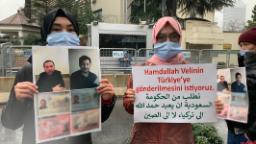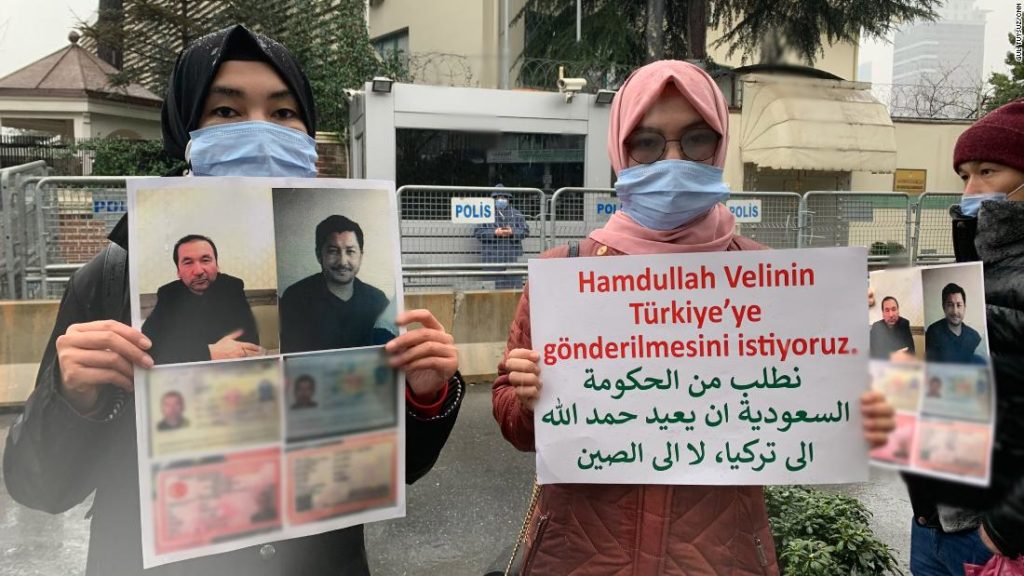
Members of the US Senate’s Foreign Relations Committee mentioned the exclusive report in a discussion with Human Rights Watch’s China Director Sophie Richardson.
“CNN reported a Uyghur man being taken from his pregnant wife in Dubai and extradited to China,” Rubio in his opening statement to the committee Thursday. “If we don’t fight back against the extraterritorial reach of the CCP (Chinese Communist Party) now, we will one day find that such practices will increase in frequency to the point that many places outside of China will be just as dangerous as the territories are directly controlled by the CCP.”
CNN’s report, published Tuesday, chronicled a series of alleged detentions and forced deportations from three major Arab countries at China’s request: the United Arab Emirates, Saudi Arabia and Egypt. One Uyghur man is still at risk of deportation from Saudi Arabia.
Reports of Uyghur disappearances have unnerved the largely Muslim global diaspora from China’s Xinjiang region, home to a variety of predominantly Muslim ethnic groups. The Uyghurs, who have their own distinct culture and language, are the largest of these.
In recent years, under President Xi Jinping, Beijing’s policy towards the region’s minority groups has hardened noticeably, prompting many to head overseas. The families of the deported fear their loved ones have ended up among the estimated 2 million Uyghurs who have been sent to internment camps in Xinjiang in recent years.
Former detainees and activists call these “concentration camps” — places where inmates are subjected to intense indoctrination intended to de-Islamize them, forced to learn Mandarin, and instructed in Communist Party propaganda.
The US State Department has accused Beijing of “genocide” against the Uyghurs. China vehemently denies allegations of human rights abuses, insisting that the Xinjiang camps are voluntary “vocational training centers,” designed to stamp out religious extremism and terrorism.
As Beijing’s global influence expands, rights activists fear that even as Western nations take China to task over its treatment of Uyghurs, countries in the Middle East and beyond will increasingly be willing to acquiesce to its crackdown on members of the ethnic group at home and abroad.
“We need to do something about these crimes even more than just call them for what they are: China’s efforts to silence Uyghurs and turn the world’s attention away from the ongoing atrocities also include coercing and intimidating those Uyghurs who live abroad. That includes American citizens, American residents, and American citizens are speaking out at great risk of having the Chinese Communist Party target themselves and their family members who remain in Xinjiang,” Rubio said.
On Thursday, Sen. Tim Kaine asked HRW’s Richardson how the US should approach Egypt, the UAE, and Saudi Arabia, citing revelations in the CNN report. Richardson urged the US and its allies to give Uyghurs the right to apply for asylum until the deportations are appropriately contested before a “competent court” in accordance with international law.
Kaine said the US would contemplate the “good thought.” If the detentions occurred in allied nations — all three countries mentioned in the CNN report are major US allies — then the US may be able to “have folks brought here under the traditional asylum rules, other nations would participate in that as well.”
The HRW receives reports of Uyghurs at risk of deportation on a weekly basis, Richardson said.
“Not a week goes by when we aren’t dealing with a case someplace of somebody who stuck in jeopardy and at risk of being sent back,” Richardson said. “(Governments) don’t understand that people simply by virtue of their ethnicity are at disproportionate risk if they are returned.”
Richardson said the first deportation of Uyghurs documented by HRW was from Cambodia in 2009. “And it has been a real struggle across different parts of Asia central Asia and increasingly the Middle East,” Richardson added.
CNN repeatedly reached out to Egypt, the UAE and Saudi Arabia for comment on the extraditions and did not receive a response. China’s government also did not respond to CNN’s request for comment.
You may also like
-
Afghanistan: Civilian casualties hit record high amid US withdrawal, UN says
-
How Taiwan is trying to defend against a cyber ‘World War III’
-
Pandemic travel news this week: Quarantine escapes and airplane disguises
-
Why would anyone trust Brexit Britain again?
-
Black fungus: A second crisis is killing survivors of India’s worst Covid wave

